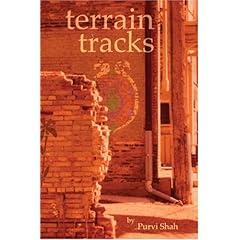

-When creation:-
A Review of Purvi Shah's Terrain Tracks
A Review of Purvi Shah's Terrain Tracks
Shah, Purvi. Terrain Tracks. New Rivers Press, 2006. (71 pages).
ISBN 978-0898232301
Meena Alexander asserts that the poems in Purvi Shah’s first book, terrain tracks, winner of the New Rivers Press Many Voices Project, tell the story “of a woman’s life lived across borders, the longing for home.” True, this book does this, but it also works to tell the stories of borders’ lives as they get lived across, as they change in response to our living on them. The poems in terrain tracks, come out with variance while they travel home. They are direct and sometimes cryptic in their narratives, poignant and sometimes mysterious in their dictions, and like “Signs there is a Hole in Manhattan” offer serious tones juxtaposed with syntactical playfulness. Sometimes Shah grounds images pastoral traditions and sometimes she offers up strange images mixed with strange sounds, as happens in “When umbilical chords become a child’s anklets.”
When silence again encroaches, she squeezes
the child against her breast. She yells
to me: Bring three people
next time you come. Bonds
loosen with a laugh
that substitutes for bells.
The poems in terrain tracks use images of nature to tell heirloom stories and use a dancer’s grace to make explicit distinctions of rhythm.
There is no rain like Gujarat monsoon,
there is no mango as sweet
as the crop that can be butter
on heat-parched hands,
there is no face at every corner
which claims family.
These poems move with devotion to display how seasons reign over continents. Elements of weather cycles demonstrate separation and connection over space. The poems are surprising and much like the spaces they embody, (India, New York) musical in their noise. terrain tracks makes a statement about the earth’s response to human mobility. Shah says she is interested most in “the human geography and humans in relation with each other and the world around them.” This landscape of human affection is apparent in the refrains of her calculations as spoken through her image progressions of soil and rain.
The rains insistently demand other creatures
to follow gravity’s trajectory—flowers in overgrown window
boxes lean out dangerously, necks hung
over the precipice.
Shah creates an ecopoetics that allows nature to be a force that is working against and working with the stories of generation. Poems like “Mango Magic” read as meditations on what nature gives us, what we give nature, and offer a turn back to what nature gives us. The poem “after 2/3 of a Village in Papua New Guinea is Decimated by Natural Disaster” works through the interconnection of place and people as affected by immigration and climate.
The winds whisper:
your generation is destined to evaporate
like dew, without residue, or the scent
of fresh oxygen against the grass.
terrain tracks is a summary of time’s markers on the body, it is a narration of the earth’s geometry as it shifts and gets drawn on by human expansion. This collection embodies a songlike voice that is both the earth’s and human reaction our shifting geographies. Shah says poetry is her form of analysis. Poems like “Songs of Spring” show off these shiny bits of her philosophical inquisition. This poet’s asking the deceptively simple questions that demonstrate her ability to discover, so many seem ‘yes no’ upon first glance as in “Songburst,”
Of so much I am unsure: can you sing
at night’s edge and lift a stranger’s heart?
Can you peer through thunder without drawing
the gaze of light? When you walk through mist,
the can you climb over trees and see the stretch of bliss?
Shah works to parallel desire & longing with seasons & weather that always comes or is always on its way. The soil the dirt and the rain and the bud coming from all of it work as her characters that guarantee longevity and growth. Nativeness manifests in the plants, in grasses and seems to cultivate as seasonally as the gardens some of these poems inhabit. The poems in terrain tracks use garden landscapes to articulate the questions and answers of rootedness.
The language of terrain tracks manages a voice that is tender and fierce with violence at the same time. They live on land and they change landscapes. Shah organizes bits Gujarati song, famous lines about tradition from the musical, Fiddler on the Roof, and snippets British Pop music to make evident her themes of leaving, expansion letting go and holding on. Shah’s discourse makes living and remakes the glossary veined from works as did Reethika Vazirani, and refrains as song as did Walt Whitman. The musicality of these poems help fugue a hybrid, new amalgamations of language for the song of American Poetry. These poems travel on straight lines in circles to no particular destination because they create a home by the motions of their movement.
Soham Patel lives in Manitou Springs, Colorado. Her poems and prose have appeared in Copper Nickel, Cranky, SHAMPOO, Stirring, and other places. She teaches writing at the University of Colorado in Colorado Springs, works as a managing editor for Pikes Peak Community College's Almagre Arts Journal, and is a Kundiman fellow.
Boxcar Poetry Review - ISSN 1931-1761